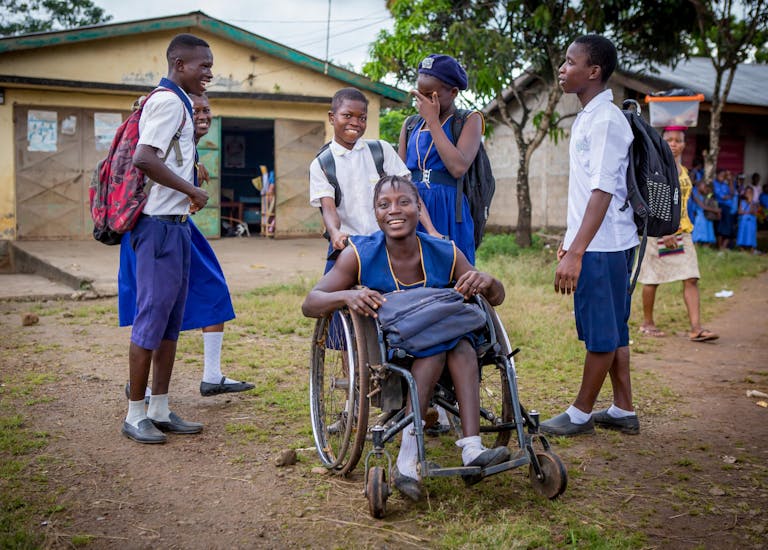Breaking down Barriers

Every day, millions of children and adults with disabilities encounter barriers that limit their rights, dignity and opportunities. Breaking down Barriers (BdB) exists to help practitioners remove those barriers using evidence that fuels practical action.
BdB is Liliane Fonds’ multi-annual research initiative aimed at strengthening disability-inclusive development through evidence-based knowledge, learning, and collaboration. Since its launch in 2014, BdB has evolved into a platform for generating actionable insights that inform policy and practice particularly in low-resource settings. By connecting academic research with real-world implementation, BdB supports more effective, evidence-informed advocacy.
Liliane Fonds has strengthened this work through strategic partnerships with academic institutions, bridging research and practice to promote sustainable disability inclusion.
Change in focus
The content focus has changed over time. Between 2015–2019, the focus was on understanding and strengthening advocacy for disability inclusion. Building on this foundation, the research agenda was expanded to disability-inclusive development, enabling broader participation and deeper learning between 2020 and 2024. This phase also included thematic research on Education and Sexual and Reproductive Health and Rights (SRHR). In the period up to 2027, the focus is on learning around Liliane Fonds’ key intervention strategy for inclusion: Community-Based Rehabilitation (CBR).
Pracademics
In terms of knowledge development process a key ingredient in BdB’s success has been the role of pracademics, who operate at the intersection of academia and practice. By blending academic quality with practical insight, Breaking down Barriers has become a model for how research and practice can work hand-in-hand to drive social impact and innovation in disability-inclusive development.
Results
| Time & Focus | Results |
|---|---|
|
2014-2020 Focus topic: Disability advocacy. Knowledge development process: Master students from the Netherlands, supported by academics and partners in the focus countries. |
In numbers
11 studies transformed into policy briefs, 2 disability advocacy and 2 peer reviewed academic papers. Results were shared in several national and international exchange events. The project won the Impact Challenge Award in 2019. Key knowledge outcomes |
| 2020-2024
Focus topic: Inclusive development with global focus on inclusive education, Sexual and reproductive health and rights (SRHR) and Community– Based Rehabilitation (CBR) Knowledge development process: Master students from local universities supported academics and partners in the focus countries. |
In numbers 20 studies transformed into 23 policy briefs. Shared in several national learning and exchange events and internationally in a international conference in 2024.Key knowledge outcomesInclusive education starts with inclusive leadership. This special edition highlights how school leaders in Cameroon, Zambia, and Sierra Leone are key drivers of change in disability-inclusive education. By fostering collaboration, supporting teachers and engaging communities, they help break down barriers for children with disabilities. The article offers practical insights and inspiring examples of how leadership can transform schools into inclusive spaces for all.What stops women and girls with disabilities from accessing family planning? This synthesis brief reveals how intersectional barriers—from stigma and religious beliefs to education level and impairment type—shape access to SRHR services in Cameroon, Zambia, Sierra Leone, and Uganda. It shows that family support, inclusive infrastructure and tailored healthcare are key to overcoming these challenges. The brief offers eight actionable policy recommendations for governments, NGOs, and communities. Unlocking Synergies: The Power of Community-Based Inclusion This new policy brief reveals how Community-Based Rehabilitation (CBR) and Community-Based Inclusive Development (CBID) programs in Sierra Leone, Cameroon, and Zambia create real impact for people with disabilities. By connecting family support, peer groups, community influencers, stakeholder forums, and service provider partnerships, these programs address both immediate needs and the root causes of exclusion. The secret? It’s the synergy between these pathways, —when they work together, their impact multiplies. But if one link breaks, the whole chain is at risk. The brief offers practical recommendations for maximizing these synergies and building truly inclusive communities. |
| 2025-2028
Focus topic: Community Based Rehabiliation and Community Based Inclusive Development (CBR/CBID) |
In numbers |
Explore the Breaking down Barriers Downloads page to access tools, briefs and insights that practitioners across countries are already putting into action.
Partners
The success of Breaking down Barriers is that of a partnership between academics and practitioners nationally and internationally. Practitioners in civil society organisations highlight the practical challenges they face to realize disability rights. Academics ensure high quality, credible research which is validated by practitioners for it’s practical relevance and subsequently used in programs and advocacy. Together, these partnerships are creating a growing community of practice that learns, adapts, and pushes inclusion further each year. Below an overview of the current partners involved in Breaking down Barriers.
Contact
Learn more about Breaking down Barriers, contact:
- Jan Apperloo, Learning & Knowledge development adviser, Breaking down Barriers coordinator.
Email: japperloo@lilianefonds.nl - Dr. Willem Elbers, Principal Investigator of ‘Breaking down Barriers’ at Radboud University.
Email: willem.elbers@ru.nl




